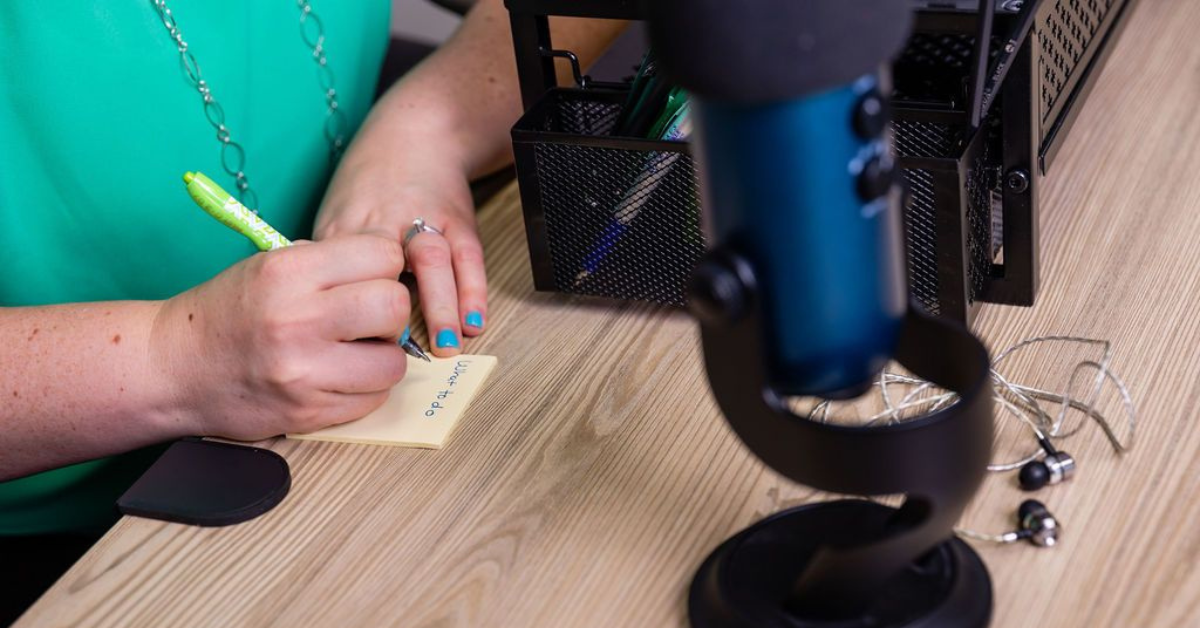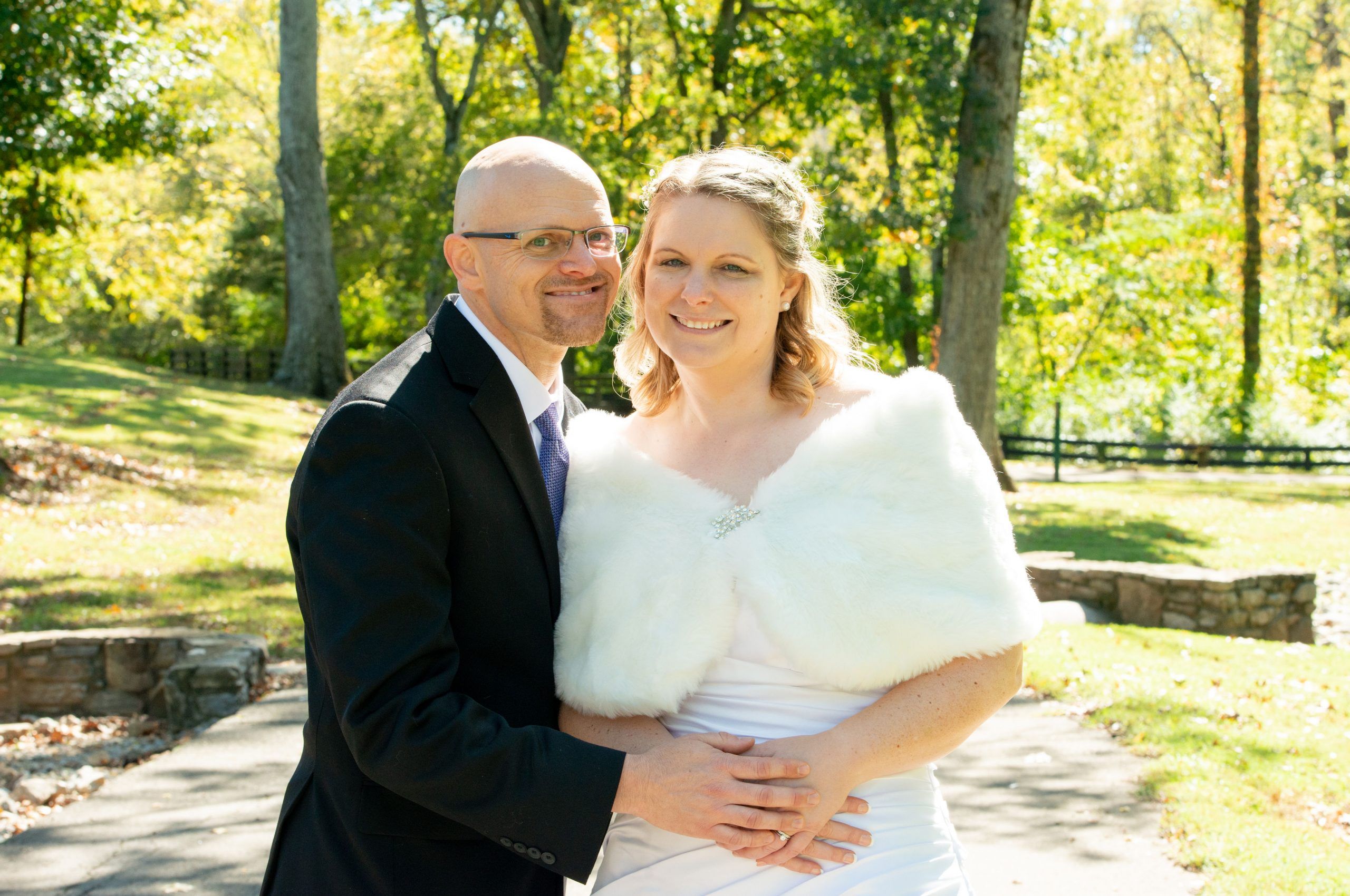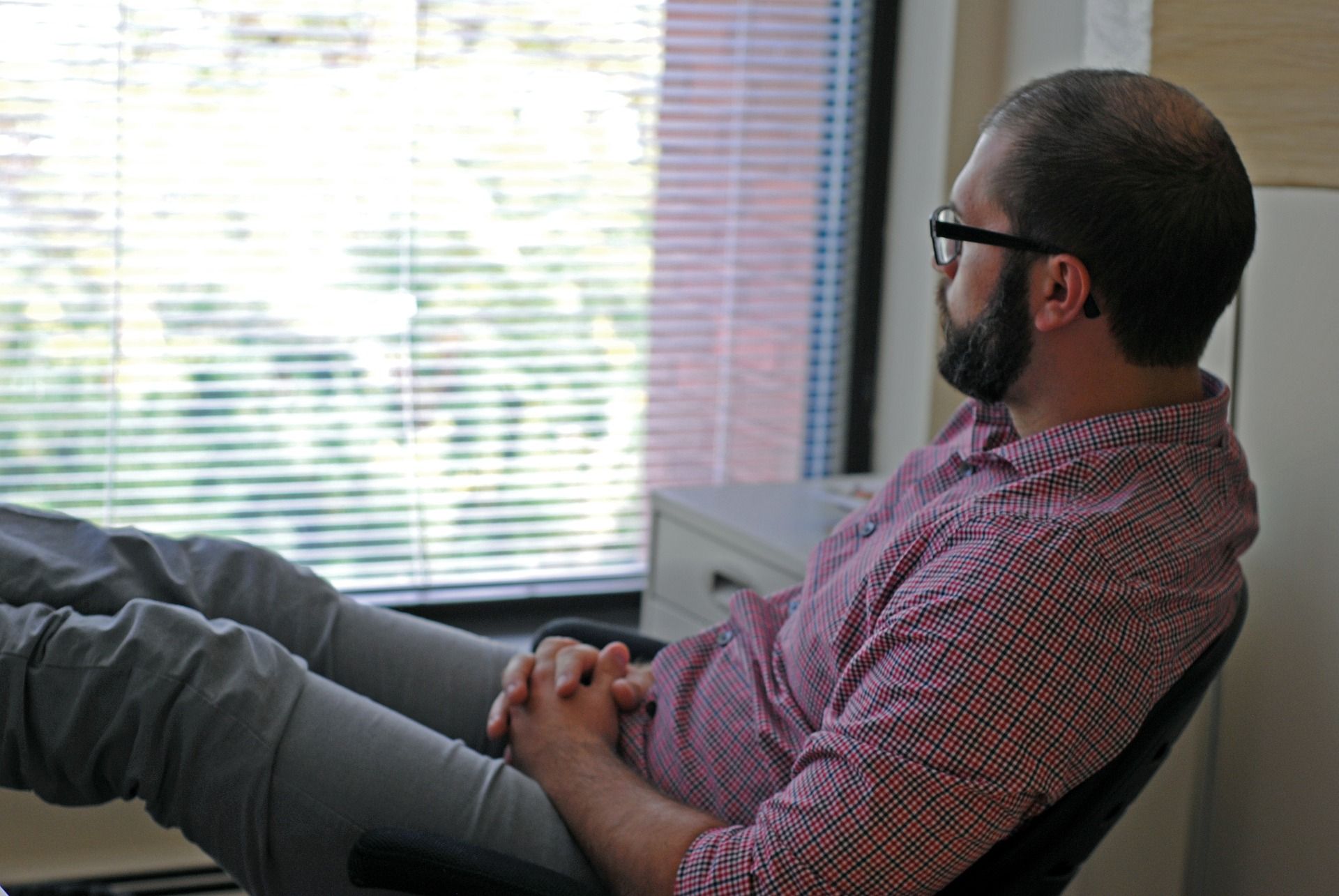49. Will Less Stuff Equal Less Anxiety? with Becca Ehrlich
Today on the show, I am joined by a Christian minimalist, pastor and author, Becca Ehrlich.
Becca and I had an interesting conversation about how minimizing and simplifying your life can help with anxiety.
Episode Highlights:
- How Becca developed an interest in minimalism
- Different aspects of minimalism
- How to be more intentional with time and energy
- The intersection between Christian faith and minimalism
- Minimalist approach to buying things
- Small steps to take to minimize and simplify your life
- How to tackle the tasks of evaluating possessions and minimizing stuff as a couple.
Episode Summary:
we’re diving into how too much stuff can overwhelm our lives and lead to anxiety. When things pile up and we can’t find what we need, it’s not just frustrating—it can also hold us back from living the life God has called us to.
In today’s episode, I’m chatting with Becca Ehrlich, a pastor and Christian minimalist. She shares her journey from living the American Dream in a big house filled with stuff to embracing minimalism. At first, Becca and her husband filled their 3,000 sq ft home with things, but when they downsized, they realized they had way more stuff than they could manage. Clutter took over their lives, making it hard to find anything, and it was weighing on their well-being.
Becca discovered minimalism after watching a documentary on Netflix, which helped her realize that living simply could bring more meaning to her life. She explains that minimalism is about focusing on what truly matters and letting go of what doesn’t, whether that’s material things, time commitments, or the pursuit of status.
Living with a chronic illness also made Becca realize the importance of being intentional with her time and energy, which minimalism helped her do. The goal isn’t just about getting rid of stuff, but about making space for what matters most—relationships, self-care, and passions.
We also discuss how minimalism can be lived out differently depending on your situation, and Becca shares why it’s important to have a personal “why” behind simplifying your life. Without it, you might just go back to your old habits of accumulating things. Becca’s “why” was to spend more time with family and friends, and this kept her motivated through the tough process.
Minimalism isn’t just a one-time declutter—it’s an ongoing journey of figuring out what adds value to your life and letting go of what doesn’t. Becca’s advice on involving kids in the process is also super helpful. It’s about teaching them early on that experiences matter more than things.
Check out this episode to learn how simplifying your life can help you focus on what really matters!
Links and Resources:
Becca Ehrlich
Book: Christian Minimalism: Simple Steps for Abundant Living
Transcript
Episode 49. If you’re new to the show, I’m your hot Carrie Bock and today we are talking about the connection between having too much stuff or clutter that invades our lives and how that can cause us anxiety. We can’t find things anymore because there’s too much stuff in the way or we have piles around maybe that is crushing our creativity, things that are keeping us, from doing everything that God has called us to do.
Carrie: So here today with me or a discussion of Christian minimalism is Becca Ehrlich, who is a pastor and Christian minimalist. Thank you for joining me today.
Becca: Thanks for having me. This is going to be fun.
Carrie: So you once had what some would quote, call the American dream like I have a spacious house and I have lots of stuff in it. What kind of suffering do you feel like coming from at some point of having too much.
Becca: I sort of bought into pun intended. The idea is that the reason we exist is to have more, more stuff, more time commitments, more things. We use our energy and time for more recognition, all of that like more status. And so we bought a 3000 square foot house and then and it was just me and my husband, and when you have that much space, you fill it with stuff cause it just looks weird to have empty space sometimes or so we’ve been told.
Carrie: Makes sense.
Becca: So did what normal folks would do in consumer culture and filled it with a bunch of stuff. And then we moved, we moved into a smaller place just because that’s what was available at the time where we were moving and we did not have enough room for all this stuff. So we rented a huge storage unit outside of town and we filled it, they call it high and tight.
So it was literally like wall-to-wall stuff, ceiling to floor stuff and we couldn’t even get into this stuff if we wanted to in that storage unit. Then in our new place, it was like stuff was coming out of corners and out of closets and it was just stuffed to the gills with all the stuff. It was just not helpful for my life I couldn’t find anything. It was things that would fall on top of me. We’ve all been there. Right? You open the closet, it is just all down and it was just not good for my well-being. I just didn’t like it and so when I discovered minimalism, which by the way is not just about stuff, right? Our issue was stuff, but a lot of other people could be other things. It made sense to us and we were like, I think we need to start living a little bit more minimally.
Carrie: How did you discover this and develop this interest in minimalism?
Becca: I watched Netflix and my life changed.
Carrie: Wow.
Becca: No one expects their life to change when they’re watching Netflix. But that is what happened. I have a chronic illness, so I was having bad health, and usually, when I have a bad health day, I kinda chill on the couch and watch Netflix or whatever. And I was browsing through, I watch a lot, a lot of documentaries and it recommended the minimalism documentary, the original one by the minimalists.
I’d never heard of minimalism before. I had no idea what I was like, well, it’s only an hour and 15 minutes. So if it’s terrible, it’s only an hour and 15 minutes of my life that I wasted and it was the opposite. Like I watched it and said, oh my gosh, I think this is something I need to do and my husband will get home from running errands and I was like, you gotta watch this and he was like, I don’t know. He eventually sat down with me and we watched it together and he said, you know what, I think this is something we need to do.
Carrie: That’s good. You definitely have to get your spouse on board if you’re married and are going to do this.
Becca: Yeah, I will say though, that like both of us have very different ways. We live out minimalism, which I think is also okay. So you don’t necessarily have to be completely on the same page and agree with all the things you just have to know. Be okay with each other, living out a very simple life.
Carrie: So you said that it’s not just about the stuff. Can you tell us about some of the other aspects of minimalism?
Becca: Yeah. So basically minimalism is a focus on the aspects of life that matter most and intentionally removing everything. So at its core, it’s living intentionally and getting rid of anything, that’s keeping you from focusing on what’s most important. So that can be anything, right? Like for a lot of people, it’s stuff, because of how consumer culture works, we’ve accumulated too much stuff, but for other people, it could be time commitments. Like maybe you said yes to all the things out of obligation or because you felt like you had to, or were expected to, or whatever.
It could be chasing wealth and status and fame. That’s also something that’s glamorized in consumer culture. So paring down your life to be more intentional and focus on the most important things like relationships and self-care, passion, and things like that.
Carrie: It’s interesting that you say that about not chasing fame and fortune. I just had a conversation with another entrepreneur this morning that we just get together and have business chat. She told me, everybody’s trying to chase this six to seven-figure thing. She’s like, I just don’t need all that. I just, I mean, I need a few thousand dollars to pay my bills and live okay.
She’s like, what do I need to make six figures for us? That’s not what’s important to me and so that’s kind of exactly what you’re saying. Like finding what’s really important and really valuable and this individual also has a daughter. So obviously it’s important for her to have time to spend with her and to have self-care and have enough rest. So do you feel like having the chronic illness or receiving that diagnosis affected this?
Becca: Oh yeah. I think for folks who don’t have an infinite amount of energy and health that’s everybody really, but especially folks who are living with illness, living more simply and more minimally, it just makes the most sense because you’re just more intentional about what you’re using your time and energy for.
So it was a no-brainer for me as someone with chronic illness, because I just have to be more intentional about how I’m using my time and energy throughout the day. Because if I don’t, by the end of the day, I’m just going to be dead meat and maybe the next day I’m going to be dead meat.
Carrie: It’s interesting because my husband, I got married last year in October and my husband calls me a minimalist, which I find kind of funny because I wouldn’t necessarily put that label on myself, but he really sees how I interact with stuff specifically for buying.
Like, I may see something and say, oh, that’s, cool or something, but I really don’t have space for that extra gadget in my kitchen. I mean, where would I put that? I just don’t know that I would really use that a whole lot, or I just don’t need that. You think about how many people have invested in multiple kitchen appliances that don’t pull them out of the cabinet or don’t use them.
I watched the documentary as you did as well and it really made me. Actually, the minimalists have a podcast I’ve listened to some of their podcasts episodes as well. And I appreciate some of their values that they repeat a lot to like using things, not people, the memories are not in the stuff like they talk about, not having to hold on to every family heirloom that you have because of your memory with your relative.
So even though I don’t think that they say anything specifically about their faith, I do believe that some of those values can be translated over and aligned, with Christian values. And I imagine that you, you found that same thing and, and that was how you started, like writing on your blog.
Becca: Yeah at the time. So when I discovered minimalism, it was the end of 2017. So there, there really wasn’t like. I researched it afterward because I was like, oh, they talk the minimums, talk a lot about meaning and so the implication being, you’ll be able to find more meaning in your life when you’re living more simply and focusing on what’s most.
Which makes sense and I was like, oh, that’s really interesting because usually meaning is something that you find through religious tradition. And for me as a Christian, I found that a lot of what they were talking about aligns very well with Jesus’s teachings and what’s in scripture. And so I was like, I want to read more in-depth about this and at the time there really wasn’t anything out there. There were a couple of articles or blog posts or maybe a YouTube video here and there, but there was nothing in Greece and that’s so that’s why I ended up writing about it. Because I was like, okay, well, I can’t be the only one that’s interested in this intersection between the Christian faith and minimalism and I wasn’t, which is great, but it’s really interesting because like when you write, you really discover things about yourself while you’re writing, it’s like, that’s why people journal and things like that.
So the blog has really helped me discover things about why I accumulated stuff in the first place and why I say yes to things when I really shouldn’t and really helped me get at the core reasons why I do things that are not serving me well And that’s helped me live more minimally.
Carrie: Talk with us a little bit about that putting the pause button on getting new things, because everyone can go through their stuff or their closet and be like, yeah, I don’t need this. I’m getting rid of it, going to give it away, whatnot put it in the garage sale. But then next thing you know, six months later, they’re back in the same place with too much stuff.
So I’m curious, like what that process was like for you, like in terms of your evaluation of buying things or having to approach things differently.
Becca: Yeah, one of the big things for me, and this is what I always tell people is that you have to find your why, your reason for, to live more simply because if you don’t do that and it’s just so like the decluttering movement. For example, it’s super trendy right now, basically, it’s just about getting rid of stuff which in itself is not bad. But like as you said, it’s not going to last, if you don’t get at the core reason why you want to simplify in the first place, because you’re just going to accumulate back the things that you got rid of eventually. So finding your personal why.
Like, for me, it was spending more time with friends and family. It could be other things for other people. Maybe you want to go back to school or whatever. There’s a wide range of wise. You want to do this but find your why, and that will also help keep you motivated because it’s not super glamorous to minimize. It sounds cool and you get halfway through and you’re like, oh my gosh, I’m going to die.
Carrie: A lot of work and I appreciate the transparency there. That’s good.
Becca: Yeah. Like everybody gets a wall at some point because it just works and it’s going a lot of times, it’s going counter-culturally and it’s going against what, how you lived previously. So it’s not only physical work, but it’s also mental, emotional, spiritual work because you’re literally shifting your worldview and your lifestyle.
So knowing why you’re doing it in the first place is going to help you get motivated to continue that process and then live it out, continue living it out. Because that’s the thing like decluttering is a one and done process. Like you get rid of stuff and you’re like, you’re done, but like you’re not done right.
It’s a constant journey that’s why I always call it the Christian minimalism journey because you’re constantly figuring out what adds value to your life and what matters most and how you can focus on that. Because a bachelor bachelorette is going to live out the minimalist lifestyle differently than someone who’s married and has three kids like that and that’s normal. So you have to kind of shift depending on your context.
Carrie: I think that’s great. Hard for people with children who may receive a lot of gifts from grandparents. He has an uncle and next thing, birthday parties, Christmas, next thing they know, there’s just piles of stuff everywhere and kids typically do not want to get on the minimalism board.
So it’s like, if you can ward some of that off ahead of time, it’s probably helpful in encouraging relatives to buy experiences instead of things. Different opportunities for that time to spend time together.
Becca: Definitely and the earlier you can start the better, but it’s never too late with kids. Joshua Becker actually has a great book called clutter-free with kids kind of outlines a lot of this or younger to older kids, which I think is great. So I think there are ways that younger children and teenagers do actually want a more simple lifestyle. But you just are so used to the consumer culture around them, that it may be a little bit of a shift for them, just like it is for us. Right but I think it’s definitely something that can be incorporated with kids.
Carrie: For you, what does being a minimalist look like on a practical day-to-day level?
Becca: Yeah, an intentional living which sounds kind of cliche, but I’m literally aware of how I’m making decisions around consumption and spending and money habits and ways. I use my time and energy and resources. Like I’m just very much aware of how I do that and how I make decisions around that. How I make those decisions has completely shifted since becoming a minimalist. It’s not that I don’t spend money and I don’t own things. I think some people hear you’re minimalist and it’s like, they picture this like room with one chair and that’s it, you know?
Carrie: Right. No pictures on the wall.
Becca: Right? Like obviously I own stuff. I have pictures on the wall. I’m currently packing to move. So I own things, but I own less things because I’m much more intentional with what I bring into my life and that includes all things. That includes things that include people that include time commitments. Media usage, I’m just very intentional with how I use all of that. And so for me, it’s a good productive day if I’ve been intentional and I made some time for rest and renewal as well.
Carrie: That’s good. Did you use to have a lot busier schedule and just kind of say yes to all the opportunities and pile them on?
Becca: Yeah, 100%. Like I was like, I was one of those I’ll rest when I’m dead type people and it was not good for me. I mean, I felt awful all the time. I was exhausted. I felt burnt out. I just wanted to disappear on a desert island and that’s not normal. We shouldn’t feel like that.
Carrie: Right, so much goodness there in terms of rest and Jesus getting away to reflect, spend time with God and really, if you look at the life of Jesus, He was very intentional about how He spent His time, who He spent His time with. I always find it interesting that in one of the early chapters of Mark, where people were coming to be healed and they were trying to get to Jesus and Jesus, looked up and left and we look at that and we’re like, that doesn’t seem right.
But it was just, He couldn’t do everything in his humanity. Like He couldn’t meet with every single person, he would have been there for years and years just doing that. He could have set up a little, but, and just had people come to Him. But that wasn’t the mission. So you had to get out and be on the move and I look at that and I think, a lot of times we try to help everybody with everything and we think that that’s like a Christian thing.
Oh, well, I’ve got to do all these good things for other people. But the reality is we need to be intentional to like our calling and what God has asked us to do globally as Christians, but also specifically. And if we miss that, because we’re looking at every single opportunity to help people, then we’re missing the boat there.
Becca: I think especially like churchgoing folks tend to be like over overextended. I don’t know why that’s a thing in Christian culture, but it totally is and that’s not even what Jesus said when God created the world. God gave us the Sabbath as a gift to re-ask and connect with God and our loved ones. And like, so we’re not even created to keep going 24/7 all the time. Like we’re not made to do that and so if we do that, we’re not, it’s not going to go well for us.
I learned that the hard way and especially with my chronic illness, that is not even doable for me. So making sure that there’s built-in time for rest and renewal, even when it’s a busy time, obviously we go through spurts where it’s busier than others. And so making sure that you build in that time, so you’re not getting burnt out.
Carrie: Sure. So we talked a little bit about some small steps that people can take to get started and you talked about I think before getting rid of stuff, like finding your why, why do you want to live more simply or more minimalistic. Looking at that, maybe what domains need to change? Is it about the stuff? Is it about how I’m spending my time? Am I overextended financially? And then what are maybe some other small steps that you feel like people can take if they’re just really beginning this journey?
Becca: Yeah. I always encourage people to start small. I think it can be very overwhelming. Like if the problem is stuff and you’re looking at a whole house filled with stuff, obviously, you’re never going to get started if you’re like, oh my gosh, I have a whole house full of stuff. I can get this big paralysis by looking at all the things you need to do. So for us, it was stuff for us. We started literally 10 to 15 minutes a day and it was easy and it was quick and you could see results really quickly and it helped motivate us to continue more because you can see tangible results.
And then when we had more time on our hands, like a Saturday, we like tackled that storage unit. I talked about it before it took many Saturdays, but finding ways to set aside time to do it and even if it’s just 5, 10 minutes a day, just start. Like, if it’s your social media usage, for example, I’ve had some people start there and being like, okay, I’m going to let myself scroll through social media for a half-hour tonight, and then I’m done.
And just being more intentional with that, because we’ve all been there over scrolling through, and it’s been like an hour and you’re like, where did that hour ago? Then you’ve lost an hour. You’re never getting that hour back and it’s probably not the best use of time. It might be if you found some cool stuff, but it’s still an hour out of your life. Just find ways to be intentional and start small.
Carrie: Yes, that’s good. So we were talking about when I intro the episode that oftentimes having a lot of stuff can lead to anxiety. Have you seen in terms of other people that you’ve interacted with or yourself personally, like a reduction in anxiety from reducing the amount of stuff or living more intentionally?
Becca: Oh, definitely. Yeah. I have a lot of folks who either have anxiety disorders that are diagnosed or feel anxious regularly. And once they cleared their space, whether that be physical, mental, emotional, social, they find that they have breathing space basically and the anxiety has lessened a little bit. Obviously, if you’re diagnosed with an anxiety disorder, it takes a lot more than that, but it can at least help the process of finding ways to handle that anxiety.
I know that for me, I feel a lot less anxious when I don’t have as much stuff or clutter in my brain or around me. They’ve done some studies around this to show that when there are less clutter people feel less anxious, less stressed. And so finding ways to make that space for yourself is really important.
Carrie: I find that true in my office, now I have a home office. And if it’s got a lot of paperwork stacked up or things that I’ve put to the side and haven’t dealt with, I just noticed that I feel more cramped in there, less free. I find myself trying to work in other areas of the house instead of being in the office, which is where I need to be in. So I can definitely attest to that. That’s true for me. And obviously, I think what we’re talking about here as well. We’re not necessarily diving into hoarding or anything of that nature, which is something that’s more extreme.
We’re just talking about the normal day-to-day American westernized way of living, unfortunately, that we often so easily, because it’s all around us in our culture. We just kind of fall into it and we don’t even realize how it’s affecting us until we get to a certain point
Becca: And actually the typical American house on average has 300,000 things.
Carrie: Wow. Isn’t that a lot of things?
Becca: It’s insane.
Carrie: Wow. I did not know that. I know for me, I’ve gone through different seasons and periods of my life where I had foster children and I had this kid stuff around. And then you wouldn’t know what ages of children you’re going to get. So I had these different toys and clothes in the attic. Then I went through a divorce and then I got remarried. My husband moved in. It’s interesting. Now we’re in kind of a similar season where we’re trying to decide what’s most important and I’m trying to be sensitive to his stuff and not just say like, ah, we don’t really need that.
So I’m curious for you, maybe you could talk a little bit about relationally in terms of working with this with your husband. Like how have you two been able to come together to achieve the common goal? Did you have certain criteria for things as you were looking through them?
Becca: Yeah, that’s a great question. And I always tell people, it’s funny, you bring that up because I always tell people do not minimize another person you’re living with stuff because it doesn’t end well, never ends well, let them deal with their own stuff.
So I always encourage people and this is something that we did is we dealt with our own stuff because obviously, we were dealing with stuff first and our own time commitments. Obviously, time commitments when we have them together. We have to have those conversations. If it’s stuff that we both use, obviously we talked through it and see if it adds value to our lives and if we want to keep it in our lives.
But keeping communication open is really key and that’s for anyone you’re living with. Right? So like it could be any family member. It could be a roommate, especially if I’ve had friends who started the minimalist lifestyle and live with. And their roommates are not minimalist, right. Finding ways like, okay, well, my own space is going to be my own space, but then also like trying to find ways to live in this way in communal spaces where other folks may not be living the same lifestyle. So just finding ways to do that and what we’ve actually seen is that a lot of times when people start living more minimally, other people see the benefits and then they start doing it after the fact.
So even if the folks you’re living with aren’t on board right away, they may be doing it later. So just do what you’re doing and they may see for themselves that it’s worth it.
Carrie: That’s good. We had a yard sale recently from just combining two households of two adults. And obviously, we couldn’t keep everything and we redecorated the house. I got let go of my office and just have my home office. So that was definitely a big downside and it was interesting to see my husband go through this process. Because I think he struggles a little bit more maybe than I do with getting rid of things. And he said, I really like such and such picture, but it just doesn’t fit with the decor of our house anymore.
Or I really enjoyed that and I think maybe somebody else will enjoy that as well. So there are, there’s something about being able to let things go and bless other people maybe that can use it more than you can.
Becca: Yeah, that was a big thing for us. So we have a son who died and we moved a couple of times with all the baby stuff because we knew we were planning on adopting at some point probably. But we didn’t know when and so we were just holding on to all this. And we realized after a few years of that when it was sitting in a storage unit that I talked about like there are families that could use this stuff right now, and we’re just collecting dust over here.
And so we don’t eat it at all and know full well that when we do adopt and we’ve started the adoption process now that we would most likely have to get it again. But we knew that was going to be a few years down the road and that we could save up to do that. So we made sure that helped us let go of it because we knew that there were families that would be using it right now and getting used out of it, as opposed to us holding onto it for years and years and years for when we’re going to use it again.
Carrie: Yes. That was something that I had to help evaluate for myself after, the foster kids left and everything. And I said, well, I have to have my space according to the life I’m living right now, not the future life I hope to have. And I don’t want my house to be full of stuff that’s just representative of the past life that I’ve lived. It has to have this balance of just being present and being in the moment. And what does this fit in with the life I’m living right now was a question that I asked myself a lot and it helped me determine which stuff needed to stay and which you could go.
Becca: That’s fantastic that you did that naturally because most of the time we hold on to it either because it made sense in the past or because we think it might make sense in the future. And like in reality, most of those in future things don’t actually happen in the past. It doesn’t, it’s not serving us now. So being like, okay, is this serving me now? Is this adding value to my life right now? And if it’s not, if it’s asked for the future, it’s okay to get rid of it.
Carrie: Right. I might need this one-day mindset.
Becca: Yeah. And like that just in case thing, like never ends up happening like 99% of the time. Right.
Carrie: Right. So as we’re getting towards the end of the podcast, I like to ask every guest to share a story of hope, which is a time in which you received hope from God or another person.
Becca: Yeah. So, I went on a three-week retreat to Costa Rica, which was not a Christian retreat. It was an alternative wellness retreat, which was a whole new experience for me. I had not really dealt with the grief around not really being able to have biological children. So my chronic illness, I have mast cell activation syndrome. It’s genetics. So it’s past, it’s 50 50 shot. that’ll get passed on if I were to have a biologic and try to have another biological child again, and it’s more severe every time it’s passed on.
So I could in all consciousness, like give birth to a child that would be disabled. So I don’t feel comfortable doing that personally. So we had felt called my husband and I to adopt at some point. Anyway, it’s just, we’re just adopting up. But I didn’t feel, I wasn’t ready to let go of the fact that I wasn’t going to have biological children, and in Christian circles, there’s a lot of weird baggage around, women and childbirth and weird stuff around that had to work through.
And I just kind of stuffed it down and not dealt with it. And so when this opportunity arose to go on this retreat, I said, okay and I did it. And I came out of it and I was ready to adopt, like I had worked through all that stuff, which was really cool.
You can actually watch this retreat and my experience, it was filmed. It’s called Last Resort. It was filmed. It was originally aired on PBS network, so you can watch it on demand there, but now it’s also streaming on HBO max. If anyone is interested in watching that, but that gave me so much more hope because I just wasn’t ready to take the next step to adopt.
And now, we already started the process. We’re really excited. We did all the educational classes and we just really excited to see what child God wants us to parent.
Carrie: That’s great. We have to be able to allow God to fully close one door so that we can be ready to receive and open that next door. I’m glad that you were able to just receive from God on that and be able to fully process through those emotions. I’m sure we’re pretty.
Becca: Yeah. And like it was interesting for me because I think there’s this mentality sometimes in Christian circles that like something needs to be Christian in order for God to work through it. And in reality, like God can work through, like God’s God. And so like, I, even though the retreat I went to wasn’t necessarily Christian and like it had indigenous cultural practices and it like, God worked through that so that I could then be ready to adopt. So I think finding ways to listen for God in places that you wouldn’t necessarily expect.
Carrie: Yeah. Yes. That’s a good point to bring up. I’m glad that you talked about that because God works in all kinds of different ways through different people and even people that don’t know him. Well, thank you for giving us the gift of your time today and I’ve really enjoyed having this conversation and I know it’s going to be a positive impact on so many of our listeners.
Becca: Great. Well, thanks so much for having me and I hope everyone is able to live a little bit more simply.









